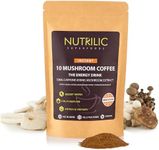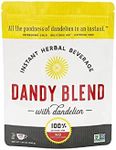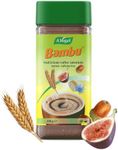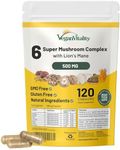Buying Guide for the Best Coffee Alternatives
Choosing the right coffee alternative can be a delightful journey, especially if you're looking to reduce your caffeine intake or simply explore new flavors. There are many options available, each with its own unique taste, health benefits, and preparation methods. To find the best fit for you, it's important to consider several key factors. Here’s a guide to help you navigate through the most important specifications when selecting a coffee alternative.Caffeine ContentCaffeine content is a crucial factor for many people when choosing a coffee alternative. Some alternatives are completely caffeine-free, while others contain small amounts. If you're looking to avoid caffeine entirely, options like herbal teas, chicory coffee, or roasted barley drinks are ideal. For those who still want a mild caffeine boost, green tea or matcha might be suitable. Your choice should depend on how sensitive you are to caffeine and whether you want to eliminate it from your diet or just reduce it.
Flavor ProfileThe flavor profile of a coffee alternative can vary widely, from nutty and earthy to sweet and fruity. This is important because it affects your overall enjoyment of the drink. If you prefer a taste similar to coffee, chicory root or dandelion coffee might be good choices. For a more herbal or floral flavor, consider herbal teas like chamomile or rooibos. Think about what flavors you enjoy and how adventurous you want to be with your taste buds.
Health BenefitsDifferent coffee alternatives offer various health benefits, which can be an important consideration. For example, green tea is rich in antioxidants and can boost metabolism, while turmeric lattes are known for their anti-inflammatory properties. If you're looking for a drink that supports your health goals, research the specific benefits of each option. Choose one that aligns with your health needs, whether it's improving digestion, boosting immunity, or reducing inflammation.
Preparation MethodThe preparation method can influence your choice of coffee alternative, especially if you have a busy lifestyle. Some alternatives, like instant chicory coffee or pre-made herbal tea bags, are quick and easy to prepare. Others, like matcha or loose-leaf teas, require more time and specific tools. Consider how much time and effort you’re willing to invest in preparing your drink. If convenience is key, opt for something that’s easy to make. If you enjoy the ritual of preparation, you might prefer options that require a bit more effort.
AvailabilityAvailability is another important factor to consider. Some coffee alternatives are widely available in grocery stores and online, while others might be harder to find. If you prefer to buy locally, check what’s available in your area. For more exotic options, you might need to order online. Ensure that your chosen alternative is easily accessible to avoid any inconvenience.
CostThe cost of coffee alternatives can vary significantly. Some options, like herbal teas, can be quite affordable, while others, like high-quality matcha, can be more expensive. Think about how much you’re willing to spend on your coffee alternative. If you plan to drink it daily, you might want to choose a more budget-friendly option. If it’s an occasional treat, you might be willing to splurge a bit more.















